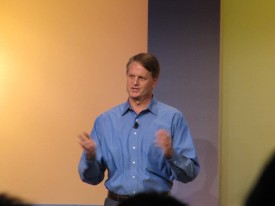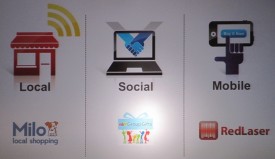Stock Trades Near 52-week High on Message That It's an All "New eBay"
Two years ago, eBay’s CEO John Donahoe promised Wall Street analysts massive changes to improve the company’s e-commerce experience.
 Today, he says it’s all “new eBay.”
Today, he says it’s all “new eBay.”
At the company’s analyst meeting at its headquarters, the company demonstrated the major changes made over the past couple of years and laid out plans for how local, mobile and social will lead the next wave of commerce.
In the afternoon, Bob Swan, eBay’s CFO, took the stage to give the financial rundown that everyone had been waiting for since the morning.
Swan highlighted PayPal’s growth trajectory by saying that it expects to double revenues over the next three years to between $6 billion and $7 billion, compared with $3.4 billion in 2010.
He also talked up how mobile was gaining speed by saying that PayPal mobile transactions were estimated to double to $2 billion in total payment volume, and that mobile on marketplaces will double to $4 billion in gross merchandise volume.
Meanwhile, when looking at the company’s gross merchandise volume, he sees the business increasing from $60 billion in 2010 to $75 billion in 2013. And, to support the strength of the business, the company anticipates generating $7.5 to $8 billion in free cash flow by 2013.
Swan wants to stress that these growth rates are being driven from the company’s core businesses, and not from the more innovative stuff eBay is working on in local, mobile and social. “We are in a different state than we were in March 2009, where the crystal ball was murky and full of potholes. Now the crystal ball is full of opportunities. We have unmatched advantages that position us to win.”
That’s possible because of the improvements the company has been making over the past two years.
“We’ve made significant and necessary changes necessary for growth. Two years ago, search was optimized for auctions and suffered. Two years from now, search will be a competitive advantage for eBay,” said Mark Carges,” eBay’s CTO of marketplaces. “We’ve rolled out many tailored experiences and selling on eBay will be vastly simplified.”
To illustrate the change, Carges showed how there’s no more irreverent banner ads on the search results page, and instead of returning up to 19 paid results, it gives shoppers the “best matches” and cuts the time in half that it takes to return results.
The company also launched the buyer protection program, which will return the price of the item and the cost of shipping to customers unhappy with purchases.

Christopher Payne, VP of eBay marketplaces North America, said the company will start to increase marketing spend on these improvements to drive awareness: “We’ve been intentionally quiet as we fixed fundamentals, but starting in the second half, we’ll start marketing this new experience.”
At lunch, analysts were so eager to talk to Donahoe he wasn’t even able to get to his seat. They crowded around him in the lobby to grill him on what impact Facebook, Apple and Google were going to have on the company’s payments aspirations.
Donahoe wasn’t phased, saying that PayPal is technology agnostic. He will support BlackBerry, Google’s Android, Apple’s iPhone — and all of the iterations they produce from phones to tablets. What’s more, he says, the company is building the tools and technology for merchants to keep up in what can be a daunting world.
Analysts appear impressed with the improvements. Today, the company’s shares traded up nearly 8 percent, or $2.57, to $34.53, coming close to marking a 52-week high.








